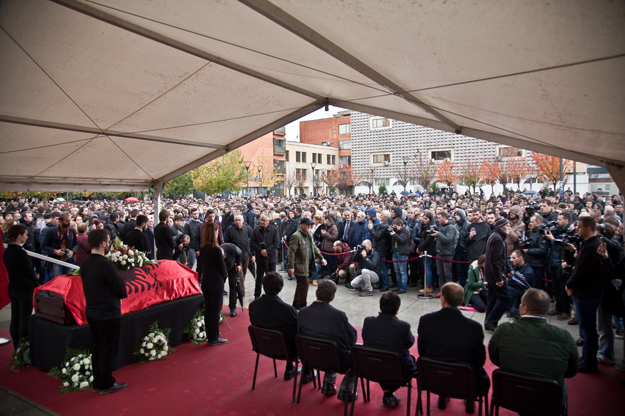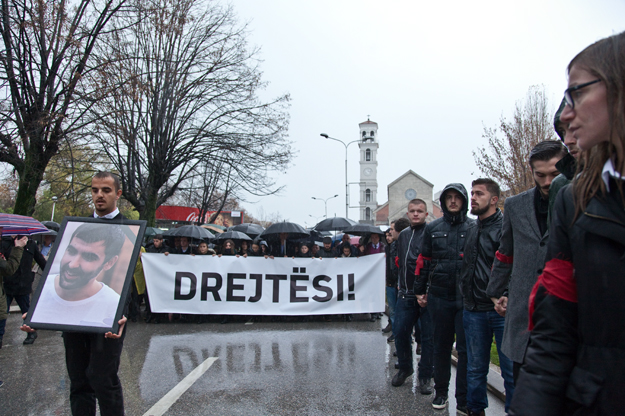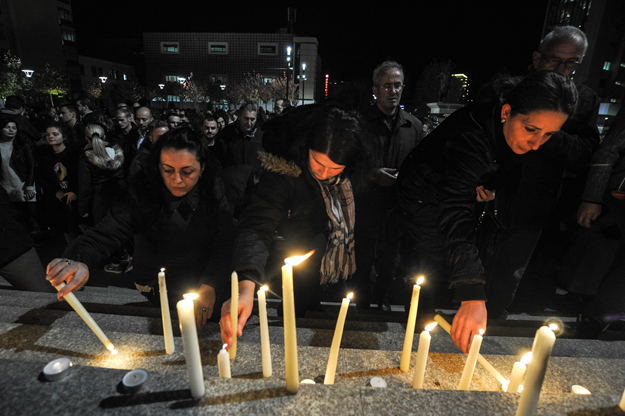Thousands of people turned out in Prishtina today on a march for justice for Astrit Dehari who died on Saturday in Prizren Detention Center. There was a sombre mood amongst the large crowd who turned up in the rain to pay their respects to the 26-year-old medical student and Vetevendosje activist.
At 12:00, to the backdrop of bells tolling in the nearby Mother Teresa Cathedral, mourners marched slowly from the University of Prishtina campus to Skanderbeg Square, where Dehari’s coffin, draped in an Albanian flag, was awaiting. Flanked by four young people dressed in black, and with family members and leading Vetevendosje members close by, mourners passed by the coffin one by one, each pausing for a moment to leave flowers or to reflect. The burial is taking place this afternoon.

Thousands of mourners paid their respects to Astrit Dehari in a solemn ceremony in Prishtina today.
Since news broke of his death on Saturday afternoon, there has been an outpouring of grief, with vigils held in towns and cities across Kosovo and in the diaspora over the weekend.
However there has also been confusion and anger, with the circumstances surrounding Dehari’s death remaining unclear. Today’s march, led by young people and Vetevendosje leaders including party leader Visar Ymeri and Albin Kurti, took place behind a banner with the simple word ‘Drejtësi!’ (‘Justice!’).

Marchers walked behind a banner reading ‘Justice!’ as questions remain over Astrit Dehari’s death.
Dehari was one of six Vetevendosje activists arrested in August in relation to an attack on Kosovo’s government building earlier in the month. He had been held on suspicion of terrorism for 68 days without charge, with opposition leaders claiming that the detention of their activists is politically motivated.
Contradictory information
Appearing at a press conference yesterday afternoon, Prizren’s chief prosecutor, Syle Hoxha, said that following an autopsy, it was confirmed that Dehari’s death was caused by asphyxiation, dismissing initial reports that the death had been as a result of a medicine overdose. “The cause of death of the now late Astrit is asphyxiation, or lack of breathing or obstacles in breathing,” he told media.
Hoxha said that the prosecution is continuing with further investigations, adding that currently there is no suspicion of anyone else being involved but that the possibility could not be ruled out. “There are no suspects,” he said. “If we find somebody, [that] becomes a suspect, [the person] will be detained and later imprisoned.”
Appearing at the press conference alongside Hoxha, Dehari’s family lawyer, Tome Gashi said: “All the necessary samples were taken and if needed, samples will also be sent to England and we are waiting for the preliminary results from the Institute of Forensic Medicine to confirm Astrit Dehari’s cause of death.”
The autopsy results come after two days of mixed and unclear information from police, prison officials and prosecutors.
On Saturday, after Dehari’s death, the police director for the region of Prizren, Nexhmi Krasniqi, told KTV that there were suspicions that Dehari death had been caused by medicines that he had consumed: “Based on initial information that we took from the correctional center in Prizren, the victim used medicine and fell into a state of coma. He passed away on the way to the emergency room, and he didn’t have any signs of life when he reached the hospital,” he said, contradicting initial statements by officials including Hoxha that Dehari had died in the hospital.
Further confusion had been caused prior to yesterday’s autopsy by suggestions reported in the media that scratch marks had been found on Dehari’s neck and hands.

A large vigil was held in Prishtina on Sunday as others were held throughout Kosovo and in the diaspora. Photo: K2.0.
Announcing the autopsy results, Hoxha ruled out the suggestion that medicines had been the cause of Dehari’s death. “We don’t have any information of that kind,” he said. “I don’t know how this information came out. At the scene the place was recorded in the most professional way and there weren’t any medicines found.”
The contradictory statements and reports that emerged immediately after Dehari’s death led his parents to request that independent doctors appointed by them be present at their son’s autopsy.
“Institutional statements qualifying our son’s death as suspicious and also the contradictions in the statements of different institutions are too much of a concern for us,” read a family statement released via Vetevendosje on Sunday. “We insist that in no way should the autopsy be held without the presence of doctors named by the family.” The request was granted by Minister of Justice, Dhurata Hoxhaj.
Earlier today, The Council for the Defence of Human Rights and Freedoms (CDHRF) office in Prizren published a report containing details of the circumstances surrounding Dehari’s death, based on interviews with his cellmates and officials within the prison. In it, a cellmate is quoted as saying that when he returned from the regular afternoon walk he found Dehari on the floor of the cell with a plastic honey bottle — that could be bought in the prison canteen — in his mouth. He said that Dehari had declined to take part in the walk, citing a headache and needing a rest, which had not seemed in any way suspicious.
Prison officials told CDHRF that Dehari had not taken any medicines during his stay in prison, while psychologists and sociologists said that he had not expressed any emotional complaints.
Calls for investigations
With correctional centers and other government institutions expected to have a high level of security and a duty of care to those within them, there have been widespread calls for an investigation into the wider circumstances surrounding Dehari’s death.
The demands have been led by Vetevendosje, who have directly accused the state for the death of their activist, saying that his imprisonment was a political act. At a press conference on Sunday, a day after Dehari’s death was announced, party leader Ymeri said: “The death of our activist Astrit Dehari, despite unclear circumstances, is the direct responsibility of the state because Astrit died at a time when he was held in prison, and because Astrit, with his friends and all of us, for 68 days have been terrorized with the lowest accusation that have not been verified.”
In an appearance on KTV last night, leading Vetevendosje deputy Kurti went further, suggesting that Dehari may have been murdered. “The latest information we have is that he has experienced a violent death in his cell, and it is not about suicide,” he said. “The doctors have said that they have never encountered such a case of suicide.”
Kurti called for international independent experts to investigate the case, as he said it was the local Kosovo Police who had initially provided incorrect information and therefore they cannot be trusted.


[…] bi trebalo da budemo strpljivi. Ipak, čim se diseminacija činjenica završi, zvaničnici koji su pogrešno informisali javnost o uzroku slučaja trebalo bi da […]